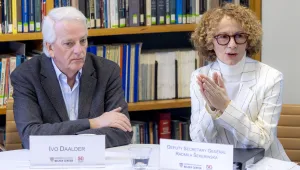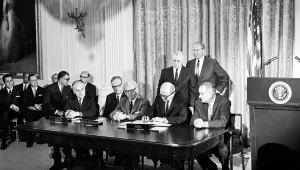Vol. 46, No. 3 (Winter 2021/22)
Featured in the Spring 2022 Newsletter »
The following articles are available in the Winter 2021/22 issue of International Security.
The articles on this page can be read on MIT Press Direct.
“Prediction and Judgment: Why Artificial Intelligence Increases the Importance of Humans in War”
By Avi Goldfarb and Jon R. Lindsay
Rather than rapid robotic wars and decisive shifts in military power, AI-enabled conflict will likely involve significant uncertainty, organizational friction, and chronic controversy. Greater military reliance on AI will therefore make the human element in war even more important, not less.
“Defending the United States: Revisiting National Missile Defense against North Korea”
By Jaganath Sankaran and Steve Fetter
The costly Ground-based Midcourse Defense system remains unproven and unreliable in deterring North Korea’s threat to use intercontinental ballistic missiles. An airborne boost-phase intercept system may offer an alternative defense against North Korea without threatening Russian or Chinese deterrents.
“Insurgent Armies: Military Obedience and State Formation after Rebel Victory”
By Philip A. Martin
When winning rebels face intense security threats during civil wars, rebel field commanders are more likely to remain obedient during war-to-peace transitions because they have less incentive to challenge newly installed rulers and less capacity to mobilize supporters outside the postwar military hierarchy.
“Assessing China-U.S. Inadvertent Nuclear Escalation”
By Wu Riqiang
Could a conventional war between China and the United States escalate to the nuclear level? An assessment of three mechanisms of China-U.S. inadvertent escalation—use-it-or-lose-it, unauthorized/accidental, and damage limitation—concludes that the risk of China-U.S. inadvertent nuclear escalation is extremely low.
“A Farewell to Arms? Election Results and Lasting Peace after Civil War”
By Sarah Zukerman Daly
An analysis of new data on postwar election results and remilitarization finds that losing elections does not drive belligerents to remilitarize. Instead, remilitarization is often determined by citizens’ ability to accurately understand and vote according to the postwar military balance of power.
Also, check out the journal's Spring issue publishing on May 13.
Highlights compiled by International Security Journal staff
"International Security Journal Highlights." Belfer Center Newsletter, Belfer Center for Science and International Affairs, Harvard Kennedy School. (Spring 2022)



